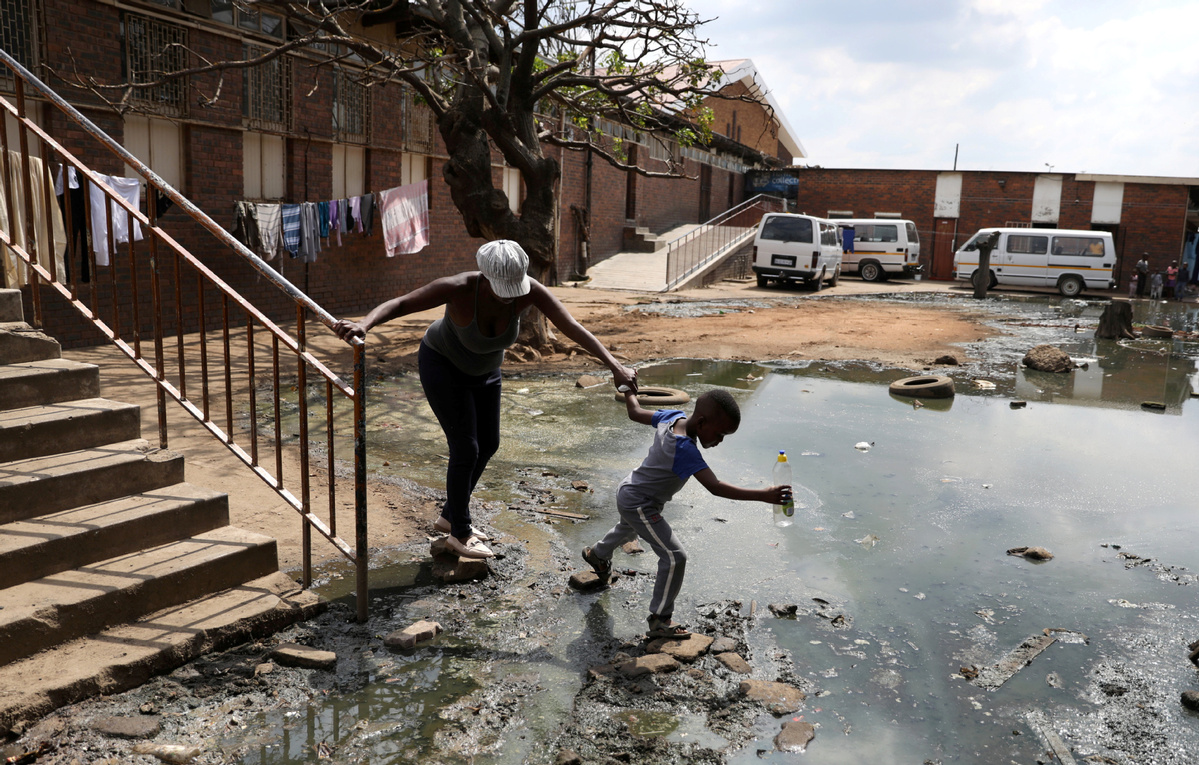
A woman and child cross through sewage water at Madala Men's Hostel during a 21-day nationwide lockdown amid the COVID-19 outbreak, in Alexandra, South Africa April 1, 2020. (Photo: Agencies)
Immediate action is needed to increase access to clean water and improve sanitation and hygiene in African nations if community transmission of COVID-19 is to be kept under control, according to an expert from the END Fund, a philanthropic organization that combats disease.
Joy Ruwodo, who is the END Fund director of public affairs for the Africa region, says improving the WASH sector — or water, sanitation and hygiene — is one of the most pressing issues as the continent braces for potential widespread outbreaks.
"Breaking transmission means we need to be creating opportunities to have clean water and access to good sanitary practices including soap and hygiene," she said. "At this point we still have healthcare facilities that still don't have that within Africa."
Ruwodo called on private sector actors, corporate high-net worth individuals and philanthropists to "channel efforts towards improving the WASH sector" across Africa.
Ruwodo was speaking from a webinar jointly hosted by the Chinese embassy in the United Kingdom and London-based think tank the Legatum Institute.
"At the height of the challenge from COVID-19 in China, our African brothers assisted us to the best of their capabilities," said China's ambassador to the UK, Liu Xiaoming. "Now, we are reciprocating African countries' support."
Liu said China has donated medical supplies and Chinese medical teams are taking part in the battle against COVID-19 in many African countries.
During the webinar, doctors, politicians and public health experts from China, the UK and several African nations shared their thoughts on how best to organize treatment and reduce transmission in Africa, especially in low-income regions with limited healthcare resources.
While COVID-19 cases remain relatively low in most African nations, the World Health Organization has warned that the continent could become the next epicenter of the epidemic. As of Wednesday, there were 69,578 confirmed cases of COVID-19 and 2,403 deaths due to the disease on the African continent, according to the Africa Center for Disease Control.
Wu Zunyou, chief epidemiologist at the China Center for Diseases Control and Prevention, emphasized the importance of quarantining and triaging infected individuals based on the severity of illness, if and when major outbreaks occur.
In Wuhan, Wu said, the use of shelter facilities for people with mild or moderate symptoms helped to both stem the spread of the disease and lower the burden on general hospitals, which were reserved for patients with more severe cases.
Wu also said that if possible, those who have been in contact with infected individuals should not be sent home to self-isolate, but rather directed to adapted temporary quarantine facilities including hotels. This is to ensure that spread of the disease within families is kept to a minimum.
Ruwodo agreed that this approach should be considered in some communities in Africa, where many people do not have the necessary floorspace or individual rooms needed to effectively isolate from their families while at home.
David Heymann, an epidemiologist at the London School of Hygiene and Tropical Medicine, who has worked in West Africa during Ebola outbreaks, highlighted the importance of engaging with traditional community leaders, particularly when it comes to crafting the most effective messaging on how to stop transmission.


